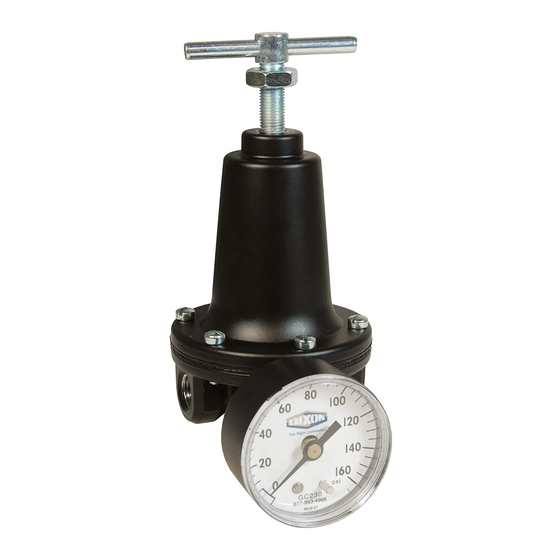Dixon R119 Series Istruzioni per l'installazione e l'assistenza
Sfoglia online o scarica il pdf Istruzioni per l'installazione e l'assistenza per Controllore Dixon R119 Series. Dixon R119 Series 2. 1/4", 3/8", 1/2", 3/4", 1", 1-1/4", 1-1/2"
Anche per Dixon R119 Series: Istruzioni per l'installazione e l'assistenza (2 pagine)

Pneumatic Division
Richland, Michigan 49083
269-629-5000
WARNING
!
To avoid unpredictable system behavior that can cause personal
injury and property damage:
• Disconnect electrical supply (when necessary) before installation,
servicing, or conversion.
• Disconnect air supply and depressurize all air lines connected
to this product before installation, servicing, or conversion.
• Operate within the manufacturer's specified pressure,
temperature, and other conditions listed in these instructions.
• Medium must be moisture-free if ambient temperature is below
freezing.
• Service according to procedures listed in these instructions.
• Installation, service, and conversion of these products must be
performed by knowledgeable personnel who understand how
pneumatic products are to be applied.
• After installation, servicing, or conversion, air and electrical
supplies (when necessary) should be connected and the product
tested for proper function and leakage. If audible leakage is
present, or the product does not operate properly, do not put
into use.
• Warnings and specifications on the product should not be
covered by paint, etc. If masking is not possible, contact your
local representative for replacement labels.
WARNING
!
Product rupture can cause serious injury.
Do not connect regulator to bottled gas.
Do not exceed maximum primary pressure rating.
Safety Guide
For more complete information on recommended application
guidelines, see the Safety Guide section of Pneumatic Division
catalogs or you can download the Pneumatic Division Safety
Guide at: www.parker.com/safety
Introduction
Follow these instructions when installing, operating, or servicing the
product.
Application Limits
These products are intended for use in general purpose compressed
media systems only.
Operating Pressure:
Maximum Inlet Pressure
Ambient Temperature Range:
Symbols
®
Relieving Regulator
Adjustable
Installation
1. The regulator should be installed with reasonable accessibility for
service whenever possible - repair service kits are available. Keep
kPa
PSIG
bar
2068
300
21.0
40°F to 125°F (4°C to 52°C)
®
Non-Relieving Regulator
Adjustable
Installation & Service Instructions
IS-R119
R119, 1/4", 3/8", 1/2", 3/4", 1",
1-1/4", 1-1/2" Series Regulators
ISSUED: October, 2010
Supersedes: November, 2006
Doc. #ISR119, EN #100901, Rev. 5
pipe and tubing lengths to a minimum with inside clean and free of
dirt and chips. Pipe joint compound should be used sparingly and
applied only to the male pipe - never into the female port. Do not use
PTFE tape to seal pipe joints - pieces have a tendency to break off
and lodge inside unit, possibly causing malfunction.
2. Install regulator so that media flow is in the direction of arrow.
Installation must be upstream (high pressure) side and as close to
the devices it is to service (valve, cylinder, tool, etc.). Mounting may
be in any position.
3. Gauge ports are located on both sides of the regulator body for your
convenience. It is necessary to install a gauge or pipe plugs into each
port during installation.
4. For protection against rust, pipe scale, and other foreign matter, install
a filter on the upstream (high pressure) side as close to the regulator
as possible.
Operation
1. Before turning on the media source turn the T-handle counterclockwise
until compression is released from the Control Spring. Then turn on
media source and adjust regulator to desired secondary pressure by
turning T-handle clockwise. This permits pressure to build up slowly,
preventing any unexpected operation of the valve, cylinders, tools,
etc., attached to the line. Adjustment to desired secondary pressure
can be made only with primary pressure applied to the regulator.
2. To decrease regulator pressure setting, always reset from a pressure
lower than the final setting desired. For example, lowering the
secondary pressure from 550 to 410 kPa (80 to 60 PSIG) is best
accomplished by dropping the secondary pressure to 350 kPa (50
PSIG), then adjusting upward to 410 kPa (60 PSIG). Tighten the
Locking Nut on the T-handle to lock the pressure setting.
Reduced Pressure Spring Ranges
"A" Range = 1 – 25 PSI (1/4", 3/8", 1/2" Only)
"B" Range = 2 – 60 PSI (1/4", 3/8", 1/2" Only)
"C" Range = 2 – 125 PSI (ALL)
"D" Range = 5 – 250 PSI (ALL)
Service
Caution: Disconnect or shut off air supply and exhaust the
!
primary and secondary pressures before servicing unit. Turning
the T-handle counterclockwise does not vent downstream
pressure on non-relieving regulators. Downstream pressure
must be vented before servicing regulator.
WARNING
!
FAILURE OR IMPROPER SELECTION OR IMPROPER USE OF
THE
PRODUCTS AND/OR SYSTEMS DESCRIBED HEREIN OR
RELATED ITEMS CAN CAUSE DEATH, PERSONAL INJURY AND
PROPERTY DAMAGE.
This document and other information from The Company, its subsidiaries
and authorized distributors provide product and/or system options for
further investigation by users having technical expertise. It is important
that you analyze all aspects of your application, including consequences of
any failure and review the information concerning the product or systems
in the current product catalog. Due to the variety of operating conditions
and applications for these products or systems, the user, through its own
analysis and testing, is solely responsible for making the final selection of
the products and systems and assuring that all performance, safety and
warning requirements of the application are met.
The products described herein, including without limitation, product
features, specifications, designs, availability and pricing, are subject
to change by The Company and its subsidiaries at any time without
notice.
EXTRA COPIES OF THESE INSTRUCTIONS ARE AVAILABLE FOR
INCLUSION IN EQUIPMENT / MAINTENANCE MANUALS THAT UTILIZE
THESE PRODUCTS. CONTACT YOUR LOCAL REPRESENTATIVE.
